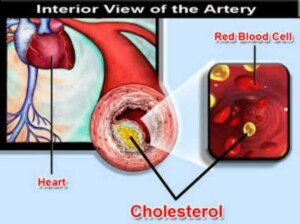
Can too much of a great thing ever be bad – at least when it comes to HDL cholesterol?
This is the “good” cholesterol that’s supposed to be high. But if it’s as high as a kite, does that mean more good or harm?
“When it comes to protecting one’s heart, high density lipoprotein cholesterol — or HDL — has long been considered the so-called good cholesterol, relative to the ‘bad’ cholesterol, i.e., LDL (low density lipoprotein),” begins says Morton Tavel, MD, Clinical Professor Emeritus of Medicine, Indiana University School of Medicine, and author of “Health Tips, Myths, and Tricks: A PHYSICIAN’S ADVICE.”
Dr. Tavel references a study out of Emory University School of Medicine that found that very high levels of HDL may be harmful — a link to increased risk of heart attack and mortality.
Subjects who had the lowest risk for heart attack or death related to heart disease had HDL between 41 and 60 mg/dL.
Participants with HDL levels below 41 or higher than 60 had a notably greater risk for serious disease.
Greater than 60 meant a 50 percent greater risk of death by heart disease or heart attack when compared to those with HDL values between 41 and 60.
What makes these findings remarkable is that the study adjusted for other risk factors for cardiovascular illness and related mortality!
• Diabetes
• Drinking
• High “bad” cholesterol (LDL)
• Smoking
• Various other risk factors
Why the association exists between higher HDL and increased risk of heart disease and heart attacks is still not known. But the association cannot be ignored.
Dr. Marc Allard-Ratick, study author of the Emory investigation, believes that extremely elevated HDL my indicate a “dysfunctional HDL” which encourages coronary artery disease rather than protects against it.
Other Studies As Well
“Studies in the past have shown that when compared to patients with more moderately high HDL levels, those with ‘very high’ HDL levels — that is — a threshold of 90 mg/dL or more — seem to have a bigger risk for heart disease,” explains Dr. Tavel.
So which levels are truly harmful? The answer is vague.
Another study (University of Copenhagen) links very high levels of the good cholesterol with increased mortality.
• Men with extremely high HDL levels had a 106 percent higher mortality rate than those with a normal HDL level.
• Women with extremely high HDL had a 68 percent higher mortality rate than did the normal group.
• Men with very high levels – but not “extremely” high, had a 36 per cent higher death rate.
• Subjects with extremely low HDL also had a high death rate.
• And who had the lowest mortality of both genders? Those with a moderate level of the good cholesterol.
Professor Børge Nordestgaard, one of this study’s authors, advises that people not get caught up with trying to get their HDL as high as possible.
He points out in the paper that HDL’s are the smallest of the lipoproteins, and that we need to pay more attention to the bigger lipoproteins like LDL and triglycerides.
What Should You Do?
Don’t freak when your lipid panel shows an HDL in the 40s. Don’t try all sorts of supplements, bitter tasting herbs, odd-tasting plant roots and forcing down raw vegetable juice in an attempt to jump the HDL into the 70s.
But do keep taking your aged garlic extract, eating wild-caught fish, lots of fresh vegetables and fruits, and restricting processed foods. And get lots of exercise.
“So what can we do about the various elevated levels?” begins Dr. Tavel. “Since the implications of the study finding remain unclear, the appropriate management is not yet defined.
“Patients with very high HDL cholesterol need to take a look at other controllable risk factors — that is, high blood pressure, smoking and weight control — to bring down cardiovascular disease risk. More research will bring clearer answers.”



























